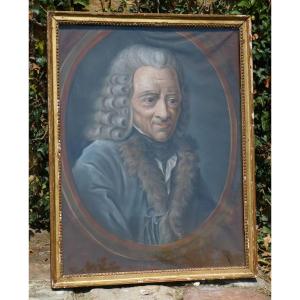"Portrait 18th Century Period, Philosopher Voltaire, Age Of Enlightenment, Pastel, Golden Frame"
Old & large pastel dating from the second part of the 18th century. Very beautiful portrait depicting the philosopher Voltaire. Glazed frame in gilded wood. 60cm x 54cm In good condition Voltaire, real name François-Marie Arouet, born November 21, 1694 in Paris where he died May 30, 1778, is a writer, notably playwright and poet, a philosopher and a French encyclopedist, figure major in Enlightenment philosophy, enjoying international fame during his lifetime. Voltaire marks his era through his literary production and his political commitments. Its influence on the educated classes was considerable in the decades preceding the French Revolution and at the beginning of the 19th century, but subsequently diminished due to the triumph of Rousseauist philosophy and the development of pre-romanticism. Anglomaniac, keen on arts and sciences, anticlerical but deist, in his Philosophical Dictionary he denounces the religious fanaticism of all periods, both in France and in other countries. Putting his notoriety at the service of the victims of religious intolerance or arbitrariness, he took a stand in cases that he made famous: the Calas and Sirven cases, and those of the Chevalier de La Barre and the Comte de Lally- Tollendal. On the political level, he is a supporter of a moderate and liberal monarchy, enlightened by the “philosophers”. His first model was the British system of government, resulting from the revolution of 1688, but for a moment he also believed he found model princes in the “enlightened despots” (Frederick of Prussia and Catherine of Russia). On the other hand, he is not favorable to the republican regime, unlike Rousseau, a citizen of the Republic of Geneva. During the first partition of Poland (the republic of the Two Nations) in 1772, Rousseau supported the Poles, Voltaire the partitioning princes.



